|
|
|
Sort Order |
|
|
|
Items / Page
|
|
|
|
|
|
|
| Srl | Item |
| 1 |
ID:
187080
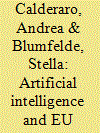

|
|
|
|
|
| Summary/Abstract |
EU Digital Sovereignty has emerged as a priority for the EU Cyber Agenda to build free and safe, yet resilient cyberspace. In a traditional regulatory fashion, the EU has therefore sought to gain more control over third country-based digital intermediaries through legislative solutions regulating its internal market. Although potentially effective in shielding EU citizens from data exploitation by internet giants, this protectionist strategy tells us little about the EU’s ability to develop Digital Sovereignty, beyond its capacity to react to the external tech industry. Given the growing hybridisation of warfare, building on the increasing integration of artificial intelligence (AI) in the security domain, leadership in advancing AI-related technology has a significant impact on countries’ defence capacity. By framing AI as the intrinsic functioning of algorithms, data mining and computational capacity, we question what tools the EU could rely on to gain sovereignty in each of these dimensions of AI. By focusing on AI from an EU Foreign Policy perspective, we conclude that contrary to the growing narrative, given the absence of a leading AI industry and a coherent defence strategy, the EU has few tools to become a global leader in advancing standards of AI beyond its regulatory capacity.
|
|
|
|
|
|
|
|
|
|
|
|
|
|
|
|
| 2 |
ID:
154838
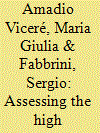

|
|
|
|
|
| Summary/Abstract |
The 2009 Lisbon Treaty institutionalised an intergovernmental constitution for managing policies traditionally a matter of national sovereignty, such as foreign and defence policies. However, important innovations were introduced in the foreign policymaking structure to limit its intergovernmental logic, in particular, with regard to the role of the High Representative (HR). It was generally assumed that those innovations would have made development of a coherent EU foreign policy possible. Yet, in one of the most significant tests for the EU’s foreign and defence policies in the post-Lisbon era, namely the Egyptian crisis (2011-14), those reforms did not work as expected. Notwithstanding the innovations, the HR’s role was diminished by the European Council’s strict control over foreign policy toward Egypt. The lack of clear policy guidelines towards the issue of democratisation in the Arab world in the 2003 European Security Strategy, although partially mitigated by the European Neighbourhood Policy and the Barcelona Process/Union for the Mediterranean, made it even more difficult for the HR to bring a European perspective into the largely intergovernmental setting.
|
|
|
|
|
|
|
|
|
|
|
|
|
|
|
|
| 3 |
ID:
190070
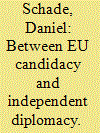

|
|
|
|
|
| Summary/Abstract |
This article considers differentiated cooperation between European Union (EU) member states and third countries in diplomatic statements at the Organization for Security and Cooperation in Europe (OSCE). Using a novel dataset on interventions in OSCE Permanent Council meetings, it analyzes when and why third countries align with the EU's positions. The observed alignment patterns underline the complexity of third country motivations to form part of the EU's diplomatic alliances, such as their institutional proximity to the organization, or their own involvement in regional conflicts. In so doing the article explores the limits of differentiated diplomatic cooperation with the EU in multilateral security organizations. It also points to the constraints the EU faces when trying to establish itself as a relevant player in European and international security through diplomatic acceptance and amplification of its own views by others.
|
|
|
|
|
|
|
|
|
|
|
|
|
|
|
|
| 4 |
ID:
164500
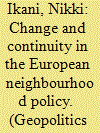

|
|
|
|
|
| Summary/Abstract |
The Ukraine crisis presented a severe geopolitical challenge to European Union (EU) policies in the neighbourhood. This is because during the course of the crisis, Russia openly challenged the EU’s economic and political integration initiatives in the region using economic, informational and eventually military means. As such, the crisis and its escalation has had ramifications across the EU in the fields of security, trade, energy security and regional cooperation. In the wake of the crisis, a clear rhetorical break with previous EU policy was announced by various key actors to respond to these challenges. Yet both the rhetoric and declared ambition for reform in response to the events is not matched by a major revision of actual policy objectives or policy tools. The question at the core of this article is how to explain the changes made to the European Neighbourhood Policy (ENP) following the Ukraine crisis. In order to provide an answer this article will build on historical institutionalism, exploring how two key historical institutionalist insights improve our understanding of the policy changes made to the ENP after the Ukraine crisis: (i) the institutional ‘effects’ and plasticity of the ENP institutions and (ii) temporal contingency. In doing so, this article takes issue with two tendencies in the current literature on policy change in the ENP. First, the lack of analytical engagement with the very notion of policy change, which throughout the literature is rarely defined or conceptualized. Second, the prevailing assumption that one should not be surprised that in the case of ENP reform after the Ukraine crisis there has been little change, due to the prevalence of policy inertia. It is argued that this oversimplifies both policy continuity and policy change. By paying particular attention to the decision-making process preceding change, this article thus aims to shed new light on the issue of EU foreign policy change.
|
|
|
|
|
|
|
|
|
|
|
|
|
|
|
|
| 5 |
ID:
184113
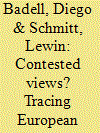

|
|
|
|
|
| Summary/Abstract |
The article explores the evolving positions and negotiation strategies of the EU and its member states regarding lethal autonomous weapon systems (LAWS). Specifically, it traces the proceedings around the UN disarmament forum Convention on Certain Conventional Weapons (CCW) from 2013 to 2020. Embedded in the norm contestation literature, the empirical section draws upon semi-structured interviews as well as document analysis. We find that, despite the absence of a CFSP position on the matter, the EU and key member states have been instrumental in shaping the discussions. However, the role of the EU is constrained due to double contestation. First, at the level of member states contestation persists on what is the appropriate regulatory framework (hard or soft law). Second, contestation is also exerted towards the EU by some member states who contest the EEAS’s involvement. Some are conscious that presenting an “EU position” might constrain their ability to build global coalitions. Others do not want the EU to interfere with their national sovereignty on such a critical security issue. While these two elements work against a common EU position, we also observe a window of opportunity for the EU. Notably, the EU can strengthen the CCW by funding the forum structures and secretariat, which could become an important body in the implementation of foreseeable agreements.
|
|
|
|
|
|
|
|
|
|
|
|
|
|
|
|
| 6 |
ID:
190064
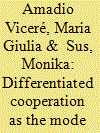

|
|
|
|
|
| Summary/Abstract |
While the standard conceptualization of differentiation in the European Union (EU) focuses on differentiated integration, scholars devote less attention to differentiated cooperation. This article argues, on the contrary, that member states’ engagement in differentiated efforts in EU foreign policy manifest themselves both in the form of differentiated integration and cooperation. It elaborates an original conceptual framework for exploring differentiated cooperation as a mode of governance. Drawing on the articles in this special issue, this introduction maps empirical manifestations of differentiated cooperation in various areas and dimensions of EU foreign policy. The results of the special issue show that differentiated cooperation has mostly manifested itself in informal patterns of cooperation, with the treaty-based mechanisms being limited. As such, the special issue reflects the differentiation and informalization processes occurring not only in the EU, but also in global governance more broadly.
|
|
|
|
|
|
|
|
|
|
|
|
|
|
|
|
| 7 |
ID:
139837
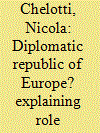

|
|
|
|
|
| Summary/Abstract |
Using an original database of 138 questionnaires, the article explores how national officials perceive their role when participating in European Union (EU) foreign policy committees. It first shows that they systematically assume not only intergovernmental but also supranational role conceptions: a good number of diplomats understand EU foreign policy as a collective political project with the objective to craft a common European policy. The article then investigates some scope conditions. If the overall picture is complex and heterogeneous, it reveals that socializing activities occur in this policy field. More specifically, the number of years spent in Brussels is a relatively strong predictor of a supranational attitude. At the same time, diplomats’ conceptions are formed also outside EU contexts: the structure and the pro-European opinions of the national polity affect the formation of a diplomat’s orientation. Remarkably, member states’ military power is a weak and non-significant variable in all the models tested.
|
|
|
|
|
|
|
|
|
|
|
|
|
|
|
|
| 8 |
ID:
092877
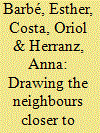

|
|
|
|
|
| Publication |
2009.
|
| Summary/Abstract |
The European Neighbourhood Policy (ENP) launched in 2004 was purposefully conceived as a strategy to encourage neighbours' approximation with the European Union (EU). This aim by the EU to extend its own system of rules beyond member states has become the focal point of the literature on the EU's relations with neighbours. In this article, however, we aim to broaden the scope of the analysis of the EU's role as it pursues policy convergence in the ENP area. More specifically, we argue that the convergence processes can be established on a basis other than EU's norms, namely, international and bilaterally developed norms. Building on this three-fold distinction, we propose a model explaining how and when policy convergence is more likely to happen on the basis of every one of these norms. The model takes into account three variables: the structure of incentives between the EU and its neighbours, mutual perceptions of legitimacy and intra-EU coherence. Based on a number of empirical examples, we illustrate that EU-based convergence is less predominant in EU's relations with its neighbours than it is usually portrayed in the literature.
|
|
|
|
|
|
|
|
|
|
|
|
|
|
|
|
| 9 |
ID:
155692
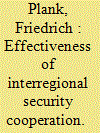

|
|
|
|
|
| Summary/Abstract |
African Union (AU)–European Union (EU) interregional security cooperation has not so far been analysed systematically with regard to its effectiveness despite the substantial support of African capacity building by the EU and joint peacekeeping of the partners. Assessing AU–EU cooperation in the Central African Republic (CAR), this paper examines to what extent and under which conditions EU–AU efforts are effective. Concerning the dependent variable, the presented conceptualisation of effectiveness includes both internal (goal attainment) and external (problem-solving) perspectives. The independent variable draws on two strands of literature that barely speak to each other: interregionalism and inter-organisationalism. It focuses on the conditions of effectiveness which include both internal (RO-specific) and interregional factors. The findings suggest that AU–EU engagement in the CAR was effective in the medium term. Strong incentives of the partners, the French leading role and the convergence of the partners are identified as factors conducive to a medium to high effectiveness of the engagement.
|
|
|
|
|
|
|
|
|
|
|
|
|
|
|
|
| 10 |
ID:
180826
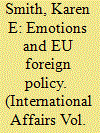

|
|
|
|
|
| Summary/Abstract |
This article assesses the role that emotions play in European Union foreign policy-making. EU decision-making has often been depicted as technocratic and ‘de-dramatized’, yet there are still situations in which emotions can affect the process and outcomes of foreign policy decision-making. Using examples of the EU's responses to crises in Ukraine and Myanmar, the article illustrates that emotions can motivate the taking of particular decisions at particular times. Further, the EU expresses emotions in its foreign policy communications, although its use of emotional diplomacy may not be accompanied by substantive action appropriate to the emotions expressed, thus revealing the existence of an emotions–action gap. The ‘emotional turn’ in foreign policy analysis can open up new directions for research in EU foreign policy, and the conclusion considers other promising avenues for researching emotions and EU foreign policy.
|
|
|
|
|
|
|
|
|
|
|
|
|
|
|
|
| 11 |
ID:
141444
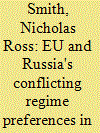

|
|
|
|
|
| Summary/Abstract |
This paper evaluates the competitiveness of the European Union (EU) and Russia's regime preferences in their foreign policies towards Ukraine in the scope of the on-going Ukraine crisis. It is argued that the underpinning geopolitical environment Ukraine currently resides in, wedged between two much larger powers (the EU and Russia), renders it a vulnerable target state for regime promotion from both sides. Indeed, since the 2004 Orange revolution in Ukraine, both the EU and Russia have had discernible regime promotion strategies in their foreign policies. The EU's regime promotion has focussed on facilitating democracy in Ukraine, along with more material interests (trade and strategic aims) while Russia has reacted with increasingly zero-sum policies which pursue its preference for having a loyal and Russian-facing regime in Ukraine. Ultimately, the increasing competitiveness of the EU and Russia has been a key factor in the onset of the Ukraine crisis, which offers important insight into the relationship between large powers and the smaller third states which lie in their overlapping spheres of influence.
|
|
|
|
|
|
|
|
|
|
|
|
|
|
|
|
| 12 |
ID:
158385
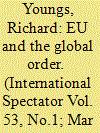

|
|
|
|
|
| Summary/Abstract |
Politicians, diplomats and analysts commonly assume that commitment to multilateralism and liberal norms is part of the EU’s very DNA. Increasingly, however, the EU’s commitment to the liberal global order is more selective. We demonstrate the shift to a more contingent liberalism by examining the EU’s recent record in relation to four different challenges: international trade; US leadership; Russian actions in the eastern neighbourhood; and security in the Middle East. We speculate on what this may portend for the EU’s self-identity, European interests and the integrity of the prevailing global order.
|
|
|
|
|
|
|
|
|
|
|
|
|
|
|
|
| 13 |
ID:
109184
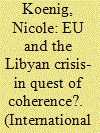

|
|
|
|
|
| Publication |
2011.
|
| Summary/Abstract |
The EU's reaction is slow; the EU is divided; the EU is unable to deliver: time and time again, newspapers depict the image of an incoherent and uncoordinated EU foreign policy. This time, the topic under discussion was the EU's response to the Libyan crisis. Many have compared the EU's internal divisions over Libya with those over the Iraq war, an often used example to illustrate the limits of the Common Foreign and Security Policy (CFSP). This article aims to assess the coherence of the EU's short- to medium-term response to the Libyan crisis. It distinguishes between the horizontal, inter-institutional, vertical and multilateral dimensions of EU coherence. The analysis shows that unilateral actions or inactions of the member states mainly account for the EU's incoherent response. The post-Lisbon institutional structure has done little to compensate for these internal divisions. While the EU cannot change the course of national foreign policies, it should increase its 'leadership for coherence', Europeanise its crisis response in the medium term and aim at preventing incoherence in the longer term.
|
|
|
|
|
|
|
|
|
|
|
|
|
|
|
|
| 14 |
ID:
159775
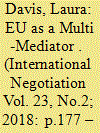

|
|
|
|
|
| Summary/Abstract |
In the 1990s, the Democratic Republic of Congo (DRC) experienced complex wars involving local, national and regional combatants and conflict drivers, which formally ended in 2002. Violence continued and the government and rebel groups negotiated a series of peace deals, most recently in 2013. The European Union (EU) has been engaged in the DRC since the 1990s. This article proposes a model for conceptualizing EU mediation engagement within the conflict and process contexts, and the necessary capabilities for different types of EU mediation. It uses the DRC case study to examine how different EU capabilities were engaged in various peace processes which addressed multiple layers of a complex situation, and also engaged with other external actors in a multilateral environment. It concludes that the EU can be conceptualized as a multi-mediator and identifies the necessary capabilities for this.
|
|
|
|
|
|
|
|
|
|
|
|
|
|
|
|
| 15 |
ID:
180071
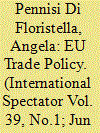

|
|
|
|
|
| Summary/Abstract |
European Union (EU) trade policy has appeared rather contradictory recently towards countries in which there are instances of human rights violations, such as Vietnam and Cambodia. Given that principled pragmatism, set down in the 2016 EU Global Strategy, entails the view that the EU approach must fit the reality of EU interests, it is a useful lens for explaining why the EU treats its trade partners differently. This is important in view of the EU’s evolving foreign and security policy in the Southeast Asian region and its distinctive economic, security and strategic interests in Vietnam and Cambodia.
|
|
|
|
|
|
|
|
|
|
|
|
|
|
|
|
| 16 |
ID:
144077
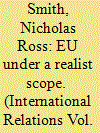

|
|
|
|
|
| Summary/Abstract |
This article breaks from the dominant liberal-idealist literature and examines the European Union’s (EU) foreign policy decisions from a realist perspective. Through employing a novel, EU-focussed neoclassical realist framework, the EU’s offer of a Deep and Comprehensive Free Trade Agreement (DCFTA) to Ukraine is argued as being a result of the mediating influence of its normative power role identity, the (mis)perceptions held by its foreign policy decision-makers and the institutional constraints inherent to its foreign policy decision-making process, which filtered systemic pressures (emanating from the European geopolitical setting) into the final foreign policy decision. Thereafter, this article assesses the EU’s responses to the Ukraine crisis, offering policy reflections and recommendations.
|
|
|
|
|
|
|
|
|
|
|
|
|
|
|
|
| 17 |
ID:
168966
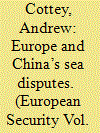

|
|
|
|
|
| Summary/Abstract |
China’s disputes with its South East Asian neighbours and Japan in the South and East China Seas have emerged as important tests of the implications of China’s rise, posing dilemmas not just for regional states but also for other global actors, including European states and the European Union (EU). European responses to these disputes have pulled in three directions: a normative approach emphasising the resolution of disputes within the framework of international law; a power balancing approach, led by France and the United Kingdom, involving support for freedom of navigation operations and strengthened bilateral and EU ties with other Asian states; and de facto acquiescence to Chinese advances in the region. In terms of understanding EU foreign policy, this case suggests a sequence: a normative approach as the initial default EU policy; a turn to power balancing when the effectiveness of that policy is called into question, but also the possibility of acquiescence and consequent divisions amongst EU member states. Europe faces dilemmas in balancing support for the United States, Japan and the South-East Asian states with its strategic partnership with China, but in practice European policy is much closer to that of the former group than that of Beijing.
|
|
|
|
|
|
|
|
|
|
|
|
|
|
|
|
| 18 |
ID:
153045
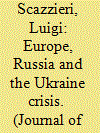

|
|
|
|
|
| Summary/Abstract |
This article analyses European strategy towards Russia during the Ukraine crisis between February 2014 and December 2015, conceptualising it as a coercive diplomatic strategy and analysing the relationship between its ends, ways and means. European strategy sought to reverse Russian intervention. However, this overarching aim was flanked by two ‘constraining’ aims of avoiding an escalation of the conflict and a breakdown of relations with Russia. The strategy shifted between these aims, which proved to be irreconcilable: while the EU partly succeeded in containing the conflict, it failed to reverse Russian intervention and relations between the EU and Russia deteriorated sharply.
|
|
|
|
|
|
|
|
|
|
|
|
|
|
|
|
| 19 |
ID:
178585
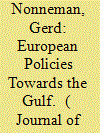

|
|
|
|
|
| Summary/Abstract |
This paper discusses European policies towards the Qatar crisis in the context of the evolution of broader past and present European policies towards the Gulf. It starts with a summary discussion of historical patterns of relations between Europe and the Gulf, before briefly sketching the major changes in the regional environment after the Second World War, beginning with the US supplanting the UK as the dominant hegemon, through to the changes wrought by Trump’s elevation to the US presidency. It then turns to a discussion of the effects of these changes for the Gulf and other regional states and their policy postures, before going on to examine the ways in which European states and the EU have interpreted and reacted to this changing environment. These reactions are often at one and the same time a reaction to the changes and uncertainties in US policy under Trump, since this changing US role is also a crucial ingredient both in the region and for Europe’s room for manoeuvre. Against this background, the paper will outline European policies towards the Gulf theater in particular, focusing on Iran and the JCPOA nuclear deal, and the GCC (or Qatar) crisis –– while also briefly considering the Yemen crisis and the impact of Gulf competition on and in the Libyan theater. From October 2018, the Khashoggi affair added an additional dimension to the crisis, as did the renewed oil price crash amidst the global COVID-19 pandemic beginning in 2020.
|
|
|
|
|
|
|
|
|
|
|
|
|
|
|
|
| 20 |
ID:
154840
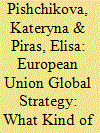

|
|
|
|
|
| Summary/Abstract |
Some dismiss the recent EU Global Strategy as a “triumph of hope over experience”, an impracticable and therefore ultimately irrelevant statement; others are enthusiastic about what they see as perseverance and renewed ambition in the face of the present crisis. Although the 2016 Strategy appears more modest than its 2003 predecessor in operational terms, the range of deliberations that fed into it and the quality of the document itself demonstrate a greater maturity of reflection on foreign policy. A critical reading of the document shows that concepts such as normative power and differentiated inclusion of neighbours in the EU’s system of governance have all but disappeared. The emerging EU identity appears to be debilitated by the centrifugal processes of internal contestation and a drastically downsized claim for external power projection. An alternative plan for action will have to deal with the Union’s vulnerabilities and carve out a role that is distinct, yet in line with this new self-understanding.
|
|
|
|
|
|
|
|
|
|
|
|
|
|
|
|
|
|
|
|
|